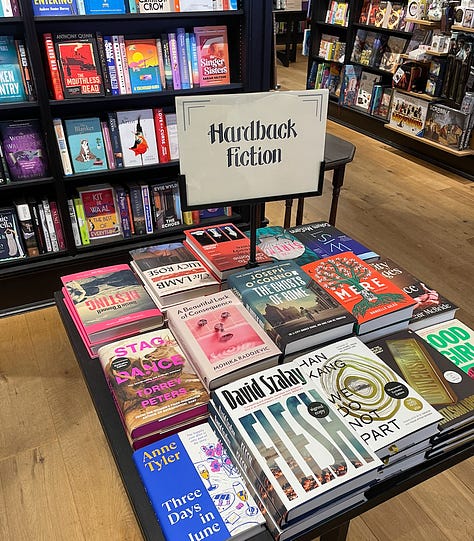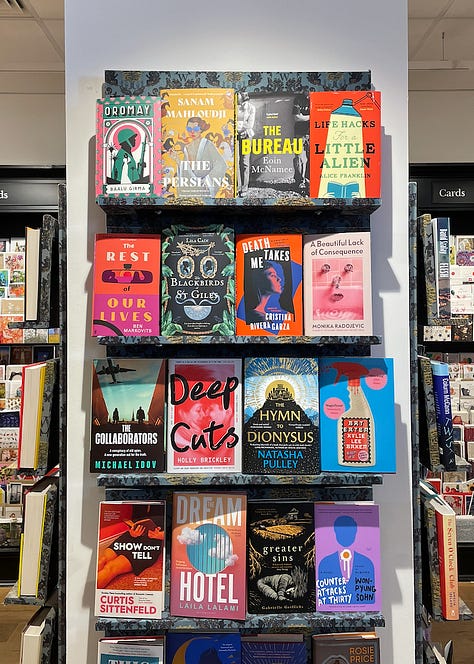My short story collection, A Beautiful Lack of Consequence (ABLOC), came out on March 20th. I’ve had a few new subscribers since then, so I hope everyone else will indulge me as I explain what it’s about - and how I feel about it one month later. I’ve also included a few reviews (obviously cherry picked) and many, many photos of the book in various locations, so you’ve been warned.
I’m also going to be quite candid about my feelings towards the UK publishing industry at the moment.
But let’s start with the book itself.
ABLOC is a collection of thirty short stories that explore the consequences women face just for existing, as well as imagining what would happen if there were no consequences at all - even if they’ve done bad things. My good friend described it as a feminist Black Mirror, which I think is a perfect summary - the stories are funny, dark, tender and fantastical. Some examples:
the words in the dictionary start changing, causing societal breakdown. When the word for ‘girl’ changes, things get really weird
a grieving woman gets high in the bath and discovers her clit can talk - and it’s got a lot of shit to say to her
a woman being interviewed about an old local bar can’t stop talking about dildos
a vigilante mother hunts down incels on the internet with the help of her AI teenager
the bee population suddenly resurges - but all the women are disappearing and no one can work out why
Some of the stories are actually flash fiction becuase of how short they are, and some are just a few lines long, interwoven through out the book like poetry. I have a few called ‘Palette Cleansers’, which are calm, gentle flashes designed to give the reader a break from some of the more intense stories. I’m so proud of this collection and the stories within them. I love how unsettling some of them are, I love that people have found them funny, I love that they’re out there in the world.

So how has it done so far?
I get asked this question all the time. I almost always say it’s done well and that I’m happy - which is true, but it’s not the whole story.
Firstly, I'm not going to provide numbers, because I don’t know them. I’ve never asked for sale numbers of my work, preferring to wait until I get royalty statements twice (these arrive twice a year and sometimes they’re extremely funny: I once made £8). I do this because the only thing I really, really hate about the publishing industry is the overemphasis on sales. Books are only considered good, or worth talking about, if they sell millions of copies quickly (or if they make it over to BookTok - a whole other can of worms for a whole other day). Obviously sale numbers are pretty important. The industry needs to make profit (which they also do by underpaying staff and writers) and so it needs to have the bestsellers and the cult classics to publish the smaller debuts like mine. I get it. I’m not sure it’s fair, and I’m especially not sure it’s fair when we’re currently living through the backlash to the social progression which expanded the rights of minorities groups, which has trickle down effects across publishing, becuase literature and knowledge is a form of resistance. But at the end of the day, no matter how I feel about it, publishing is a for profit industry.
Something I learnt when I first began writing in earnest is that 99.9% of best sellers are not organic. Publishers decide ahead of time which books will make the big bucks, pouring thousands, even millions into marketing campaigns and outreach that will ensure copies fly off the shelves. That’s not to say that those books aren’t amazing, or that those writers don’t deserve it. I’ve discovered some of my all time favourite books because they’ve been bestsellers. And one of the best things about fiction writing, in my opinion, is how little of a zero-sum-game it is. When people sell a hundred thousand copies of a brilliant book, it doesn’t equate to readers not buying your own, or devalue yours. If anything, it will help. The more reading is seen as popular and profitable the better it is for writers. It’s the very best part of the industry - but this is also a reminder that publishing is opaque and full of contradiction. It requires a constant juggling of yourself, the human - who needs to be paid for what they do, and yourself, the artist - who wants to create, and wants to be seen. Publishers want your art, but they want to commodify it too - unfortunately that typically sits at odds with the person at the centre, the writer. Even though you also want your book to sell - and no writer in the world would ever complain about becoming a bestseller. It’s weird. It’s the consequence of this capitalist world we’re in.
Secondly, I think the way the English publishing industry treats poetry and short stories - and, I assume, other genres like screenplays - is really disappointing. There is an overemphasis on novels, becuase they sell more. I’m lucky enough to be a published poet and a published short story writer, and I’ve seen the difference in media interest, marketing plans and speaking opportunities - especially in comparison to novels. Over the over the message is: poetry doesn’t really sell. Short stories don’t really sell. Therefore, we’ll buy the work off you, but it will have a smaller advance, a smaller marketing budget, and less investment over all. To me, not only is the idea that these genres aren’t worth investing in completely untrue, it becomes a self-fulfilling prophecy. I think poetry and short stories would sell by the bucket if those genres were invested in properly, and it’s a shame that there isn’t more diversity (in every sense of the word) for readers to choose from. This might be coming across as whiny - I’m probably too close to the knife edge to really unpack this one at the moment, but maybe later down the line. I have a novel coming out next year, and it will be really interesting to compare that to my previous experiences.
Here’s what has been amazing though
There is no sweeter feeling than walking into a bookstore and seeing your book on the shelf. Your blood is singing, your face hurts from smiling, your heart is beating far too fast - and you’re looking around to see if anyone else is as excited as you are (they’re not). It never gets old. Especially when your name is nestled amongst other incredible writers - there’s a feeling of collective solidarity and excitement. Other writers have been so supportive. This means a lot, becuase they’re the only people who understand how exposing it feels to have your work out in the world for anyone to read.
Reviews have been amazing, readers have been even better. People have bought it in Australia, the US, Norway and Brazil. Others have messaged to ask where they can get their hands on a copy, or told me that they’ve really enjoyed it, or that they love the cover, or that they want to give it as a gift. Writers collect moments like this like shiny pebbles, to look over them later, to polish them, to display them in the corner of our brain that is fundamentally self-obsessed. Someone I know - who is in their sixties - read the book and is now bringing to their book club. She recommended it to her friend, a secondary school teacher, who's going to read it with their A-level students. I honestly can’t think of a more perfect audience, and I’m so humbled and thrilled to know that young women might be introduced to my work. The book is, after all, dedicated to them.
So yes, things are going well, and I’m really happy. To me there is no greater privilege than being published - for all the ways I’ve decided to complain about it in this post, there are a thousand more parts that I love. I still can’t believe that I get to do it.
I wrote about pre-launch anxiety recently, but I neglected to mention that there is an aftertaste. For me, pre-launch anxiety starts roughly three months before publication, and post-launch anxiety usually hangs about for 6-8 weeks too. Those are the weeks when you wonder if it was all worth it. The answer of course, is always yes. But, when writing fiction, I think it can be good at times to thoroughly romanticise and suffer through the process, to feel the rawness of it and live so intensely in your own creative output. Just for a little while. That’s usually where the best work is to be found.









A quick favour. I love writing these posts, and I intend to do them for free for as long as I can. If you enjoyed reading this, forward it to a friend (or three) who you think might like it too. It helps massively, because validation from strangers is truly the only thing that makes the horrors bearable for me.





